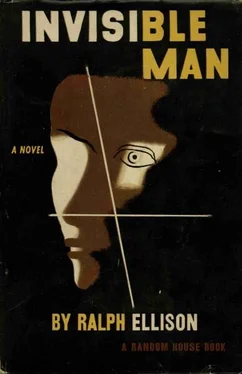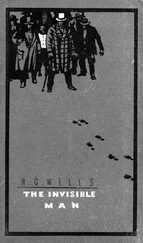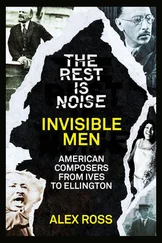Ralph Ellison - Invisible man
Здесь есть возможность читать онлайн «Ralph Ellison - Invisible man» весь текст электронной книги совершенно бесплатно (целиком полную версию без сокращений). В некоторых случаях можно слушать аудио, скачать через торрент в формате fb2 и присутствует краткое содержание. Год выпуска: 1995, ISBN: 1995, Издательство: Vintage Books, Жанр: Классическая проза, на английском языке. Описание произведения, (предисловие) а так же отзывы посетителей доступны на портале библиотеки ЛибКат.
- Название:Invisible man
- Автор:
- Издательство:Vintage Books
- Жанр:
- Год:1995
- ISBN:9780679732761
- Рейтинг книги:4 / 5. Голосов: 1
-
Избранное:Добавить в избранное
- Отзывы:
-
Ваша оценка:
- 80
- 1
- 2
- 3
- 4
- 5
Invisible man: краткое содержание, описание и аннотация
Предлагаем к чтению аннотацию, описание, краткое содержание или предисловие (зависит от того, что написал сам автор книги «Invisible man»). Если вы не нашли необходимую информацию о книге — напишите в комментариях, мы постараемся отыскать её.
The Waste Land,
Invisible man — читать онлайн бесплатно полную книгу (весь текст) целиком
Ниже представлен текст книги, разбитый по страницам. Система сохранения места последней прочитанной страницы, позволяет с удобством читать онлайн бесплатно книгу «Invisible man», без необходимости каждый раз заново искать на чём Вы остановились. Поставьте закладку, и сможете в любой момент перейти на страницу, на которой закончили чтение.
Интервал:
Закладка:
"That's enough. He was a great man. You just take a look at him once in a while. You have everything you need -- paper and stuff like that?"
"Yes, I have, Brother Tarp. And thanks for the portrait of Douglass."
"Don't thank me, son," he said from the door. "He belongs to all of us."
I sat now facing the portrait of Frederick Douglass, feeling a sudden piety, remembering and refusing to hear the echoes of my grandfather's voice. Then I picked up the telephone and began calling the community leaders.
They fell in line like prisoners: preachers, politicians, various professionals, proving Clifton correct. The eviction fight was such a dramatic issue that most of the leaders feared that their followers would have rallied to us without them. I slighted no one, no matter how unimportant; bigshots, doctors, real-estate men and store-front preachers. And it went so fast and smoothly that it seemed not to happen to me but to someone who actually bore my new name. I almost laughed into the phone when I heard the director of Men's House address me with profound respect. My new name was getting around. It's very strange, I thought, but things are so unreal for them normally that they believe that to call a thing by name is to make it so. And yet I am what they think I am ...
OUR work went so well that a few Sundays later we threw a parade that clinched our hold on the community. We worked feverishly. And now the clashing and conflict of my last days at Mary's seemed to have moved out into the struggles of the community, leaving me inwardly calm and controlled. Even the hustle and bustle of picketing and speechmaking seemed to stimulate me for the better; my wildest ideas paid off.
Upon hearing that one of the unemployed brothers was an ex-drill master from Wichita, Kansas, I organized a drill team of six-footers whose duty it was to march through the streets striking up sparks with their hobnailed shoes. On the day of the parade they drew crowds faster than a dogfight on a country road. The People's Hot Foot Squad, we called them, and when they drilled fancy formations down Seventh Avenue in the springtime dusk they set the streets ablaze. The community laughed and cheered and the police were dumfounded. But the sheer corn of it got them and the Hot Foot Squad went shuffling along. Then came the flags and banners and the cards bearing slogans; and the squad of drum majorettes, the best-looking girls we could find, who pranced and twirled and just plain girled in the enthusiastic interest of Brotherhood. We pulled fifteen thousand Harlemites into the street behind our slogans and marched down Broadway to City Hall. Indeed, we were the talk of the town.
With this success I was pushed forward at a dizzy pace. My name spread like smoke in an airless room. I was kept moving all over the place. Speeches here, there, everywhere, uptown and down. I wrote newspaper articles, led parades and relief delegations, and so on. And the Brotherhood was going out of its way to make my name prominent. Articles, telegrams and many mailings went out over my signature -- some of which I'd written, but most not. I was publicized, identified with the organization both by word and image in the press. On the way to work one late spring morning I counted fifty greetings from people I didn't know, becoming aware that there were two of me: the old self that slept a few hours a night and dreamed sometimes of my grandfather and Bledsoe and Brockway and Mary, the self that flew without wings and plunged from great heights; and the new public self that spoke for the Brotherhood and was becoming so much more important than the other that I seemed to run a foot race against myself.
Still, I liked my work during those days of certainty. I kept my eyes wide and ears alert. The Brotherhood was a world within a world and I was determined to discover all its secrets and to advance as far as I could. I saw no limits, it was the one organization in the whole country in which I could reach the very top and I meant to get there. Even if it meant climbing a mountain of words. For now I had begun to believe, despite all the talk of science around me, that there was a magic in spoken words. Sometimes I sat watching the watery play of light upon Douglass' portrait, thinking how magical it was that he had talked his way from slavery to a government ministry, and so swiftly. Perhaps, I thought, something of the kind is happening to me. Douglass came north to escape and find work in the shipyards; a big fellow in a sailor's suit who, like me, had taken another name. What had his true name been? Whatever it was, it was as Douglass that he became himself, defined himself. And not as a boatwright as he'd expected, but as an orator. Perhaps the sense of magic lay in the unexpected transformations. "You start Saul, and end up Paul," my grandfather had often said. "When you're a youngun, you Saul, but let life whup your head a bit and you starts to trying to be Paul -- though you still Sauls around on the side."
No, you could never tell where you were going, that was a sure thing. The only sure thing. Nor could you tell how you'd get there -- though when you arrived it was somehow right. For hadn't I started out with a speech, and hadn't it been a speech that won my scholarship to college, where I had expected speechmaking to win me a place with Bledsoe and launch me finally as a national leader? Well, I had made a speech, and it had made me a leader, only not the kind I had expected. So that was the way it was. And no complaints, I thought, looking at the map; you started looking for red men and you found them -- even though of a different tribe and in a bright new world. The world was strange if you stopped to think about it; still it was a world that could be controlled by science, and the Brotherhood had both science and history under control.
Thus for one lone stretch of time I lived with the intensity displayed by those chronic numbers players who see clues to their fortune in the most minute and insignificant phenomena: in clouds, on passing trucks and subway cars, in dreams, comic strips, the shape of dog-luck fouled on the pavements. I was dominated by the all-embracing idea of Brotherhood. The organization had given the world a new shape, and me a vital role. We recognized no loose ends, everything could be controlled by our science. Life was all pattern and discipline; and the beauty of discipline is when it works. And it was working very well.
Chapter 18
Only my Bledsoe-trustee inspired compulsion to read all papers that touched my hands prevented me from throwing the envelope aside. It was unstamped and appeared to be the least important item in the morning's mail:
Brother,
This is advice from a friend who has been watching you closely. Do not go too fast. Keep working for the people but remember that you are one of us and do not forget if you get too big they will cut you down. You are from the South and you know that this is a white man's world. So take a friendly advice and go easy so that you can keep on helping the colored people. They do not want you to go too fast and will cut you down if you do. Be smart ...
I shot to my feet, the paper rattling poisonously in my hands. What did it mean? Who'd send such a thing?
"Brother Tarp!" I called, reading again the wavery lines of a handwriting that was somehow familiar. "Brother Tarp!"
"What is it, son?"
And looking up, I received another shock. Framed there in the gray, early morning light of the door, my grandfather seemed to look from his eyes. I gave a quick gasp, then there was a silence in which I could hear his wheezing breath as he eyed me unperturbed.
"What's wrong?" he said, limping into the room.
I reached for the envelope. "Where did this come from?" I said.
Читать дальшеИнтервал:
Закладка:
Похожие книги на «Invisible man»
Представляем Вашему вниманию похожие книги на «Invisible man» списком для выбора. Мы отобрали схожую по названию и смыслу литературу в надежде предоставить читателям больше вариантов отыскать новые, интересные, ещё непрочитанные произведения.
Обсуждение, отзывы о книге «Invisible man» и просто собственные мнения читателей. Оставьте ваши комментарии, напишите, что Вы думаете о произведении, его смысле или главных героях. Укажите что конкретно понравилось, а что нет, и почему Вы так считаете.











